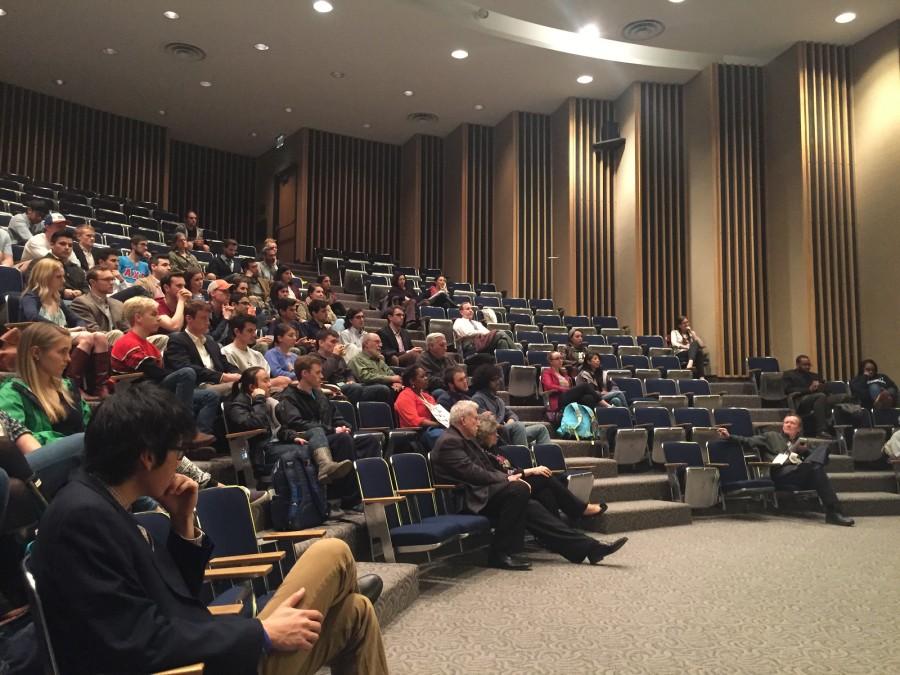“Whispering Black” stomps on tiptoeing-around-racism phenomenon
April 9, 2015
Amid an abundance of both hushed and unhampered discussions of racial tensions and how to combat prevalent attitudes of white privilege on campus, the Chi Phi Fraternity hosted the 30th annual Biff Hoffman Diversity Lectureship series on April 7 in the LC Forum. Filmmaker, author, speaker, and minority rights activist Molly Secours presented her talk “Whispering Black: Code Name for Whites” to both members of the campus community and the public.
The talk was organized and funded by both the Chi Phi Fraternity and the Office of the Provost. In the past, the lectureship speaker has been chosen because of his or her experience or unique perspective on “topics that divide people,” according to Chi Phi Academics Chair Jonathan Leung ’17, who was responsible for planning the event. Past themes for the lectureship series have included gender identity and sexuality.
In her talk, Secours demonstrated ways in which her own white privilege, unbeknownst to her, had blinded her from realizing the historical and institutionalized discrimination that members of almost any community embody and experience on a day-to-day basis–without even knowing it.
An open forum was held a few hours prior to the event, and just three students were in attendance, along with Secours, a Chi Phi alumni adviser, and several members of the Chi Phi Executive Board. During the open forum, which is the first of its kind for this lectureship series, issues were discussed such as the expulsion of three students following racist remarks made on a WVBU radio show, racial micro-aggressions (a form of unintended discrimination) on campus, and how to combat divisions on campus between different groups.
Even at the open forum, an unintentional micro-aggression was made when one attendee asked a black attendee what all black members of the campus community felt about Greek life on campus. This example only serves to reinforce Secours’s argument that people need to be better educated about the pervasive discrimination that occurs in all areas of the world. Discrimination needs to be addressed head-on in order to gain some semblance of equality or fairness between races, and people need to stop “whispering” about things that might cause discomfort.
Shaneka Dixon ’15 attended both the open forum and Secours’s talk, and made a public display of discontent with recent events on campus by wearing a sign around her neck that read “Am I the N*** to be Lynched,” as well as a rope noose around her neck and a piece of tape over her mouth.
“[The WVBU incident] kind of confirmed what I thought of many Bucknellians … These kids got in trouble when they said it over the radio, but what happens when a bunch of white people get together in a room? What are they saying then, when they can’t get in trouble?” Dixon said at the open forum.
Leung said that it seemed as though one of the main takeaways from this incident and the resulting discussions has been that students should “be careful what you say and when you say it–as if it’s okay to say it when it’s in a different environment.”
Among ideas addressed at the open forum, there was recognition of the fact that the Greek community serves to unite some groups of people while dividing and alienating others, especially minority groups on campus. One idea mentioned was to pair Greek organizations and multi-cultural organizations once or twice a semester to jointly host a dinner or a philanthropy event that would serve to familiarize Greek and non-Greek affiliated students to one another.
“The biggest thing is actually showing up. Not just throwing money at the event, but being there and being involved in the event,” Dixon said, who agreed that the idea could have some potential. “A lot of good can be done by just forming personal relationships.”
While the timeliness of Secours’s discussion is undeniable considering the recent WVBU incident, it is nonetheless coincidental. The talk had been planned since November, and just happened to occur at a time when tensions are running high on campus.
Secours realized this, and addressed it during her talk. She pressed the student body to seize this moment, while discussions are flowing and the administrations and student groups are feeling heightened motivation toward revolutionizing the campus climate surrounding racial tensions.
One of the biggest tangible efforts she advised working toward is pressuring the administration to make an African-American History course a requirement, rather than an elective, for all students at the University. While the knee-jerk response is to counter this suggestion, citing that this serves to further discriminate against other minority groups in the United States, Secours disagrees.
“African-American history is American history, and you students are the only ones who the administration is going to listen to. If the entire campus has the same base knowledge and [is] working off of the same stuff, you now have a campus full of people who are much more informed. If you don’t have an underlying sense of history, there is little you can do,” Secours said.
“My hope is that people have an introspective attitude coming away from it, examining themselves and figuring out how they can become part of a more inclusive campus,” Leung said about the impact of the event.






















